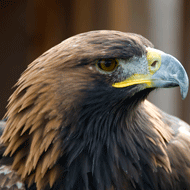A third of golden eagle disappearances ‘suspicious’

Out of 131 young golden eagles, 41 vanished in suspicious circumstances between 2004 and 2016.
Nearly a third of golden eagles being tracked by satellite in Scotland died in suspicious circumstances, according to a new report.
Scientists from Scottish Natural Heritage found clusters of these disappearances in six areas associated with grouse moor management. Out of 131 young golden eagles, 41 vanished in suspicious circumstances between 2004 and 2016.
Scottish environment secretary Roseanna Cunningham called the findings “deeply concerning” and said there is “every reason to believe” that a similar level of persecution affects golden eagles that are not satellite tagged.
Ms Cunningham confirmed she will set up an expert group to look at how to manage grouse moors legally and sustainably. The group will also advise on the option of licensing grouse shooting businesses.
“We have already targeted wildlife criminals, and those who sanction such crimes, by introducing measures such as vicarious liability and restrictions on the use of general licenses,” she explained. “But Scottish ministers have always said they would go further if required - and that is what I am doing today.
“The continued killing of protected species of birds of prey damages the reputation of law-abiding gamekeepers, landowners and indeed the country as a whole. Those who carry out these crimes do so in defiance of the will of parliament, the people, and their own peers. That must end.”
A new package of measures to tackle the issue includes a review of legal measures to target areas of concern, increased resources for the detection and investigation of wildlife crimes, and a pilot scheme using special constables in Cairngorms National Park.



 The latest
The latest